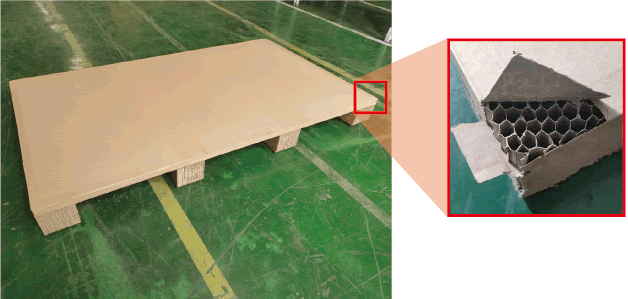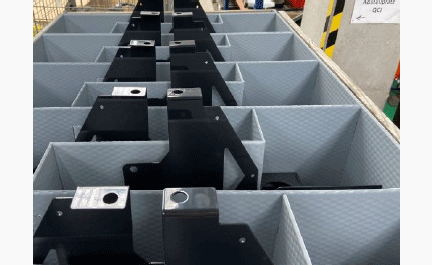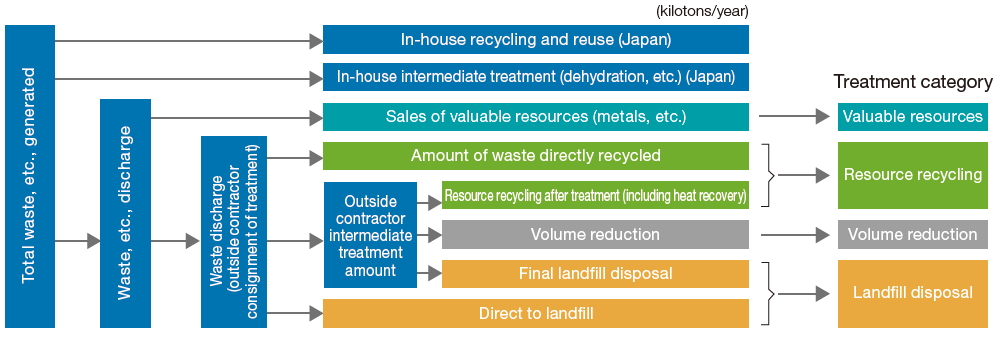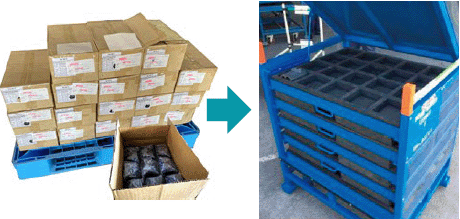Working towards a Recycling-based Society
As a result of being a mass-production, mass-consumption, and mass-disposal society, we now face many problems such as the depletion of resources and increasing waste. The increase in plastic waste has led to marine plastic pollution in the worldʼs oceans—now a serious problem for society.
The Kubota Group sees working towards a recycling-based society as one of its materiality, and has been advancing initiatives to promote “reduce” (reducing the amount generated), “reuse” (internal recycling and reuse), and “recycle” (improving the recycling ratio) of waste, in addition to initiatives to promote the effective use of resources and resource saving.
- 【ESG Report】Working towards a Recyclingbased Society
- Medium- and Long-Term Environmental Conservation Targets and Results
Activities towards achieving SDGs
| Related SDGs and targets |
 |
|---|---|
| Major Activity Content |
|
| 2025 Activity Targets (KPIs) |
|
Measures to Reduce Waste
The Kubota Group has established the Medium-Term Environmental Conservation Targets and is working to reduce the emissions of waste and hazardous waste and increase the resource recycling ratio at production sites. The Group has been promoting various measures, such as ensuring that waste is separated properly according to type and disposal method, switching to returnable packaging materials and recovering valuable resources, and utilizing recycled materials at sites. The Group is continuing to reduce the volume of sludge, waste oil, and oily wastewater generated from painting processes (by changing pre-treatments), as well as waste plastic generated from plastic molding processes. Meanwhile, as measures to reduce disposable plastics, we introduced initiatives at certain worksites to withdraw the use of disposable tableware in the employee cafeteria and reduce the issue of plastic shopping bags in on-site stores.
-

At the Kubota Sakai Plant, some of the wooden boxes and pallets used for test components imported from our Group company in China have been swapped for reinforced cardboard, helping to reduce wood scraps. Furthermore, we are taking steps to introduce reusable plastic pallets and to make wooden pallets returnable.
Examples of Collaboration with Other Companies
At Kubota Baumaschinen GmbH in Germany, the use of reusable containers is being trialed in collaboration with suppliers in order to reduce packaging waste. The volume of waste derived from packaging materials brought into the factory amounts to 755 tons annually. The materials used in packaging include cushioning materials, cardboard, and adhesive tape. The use of reusable containers will not only mean the company can cut down on waste, but it also benefits suppliers by enabling them to reduce the materials needed for deliveries.
-

(Before) Construction machinery parts delivered to the factory
-

(After) Parts housed in reusable containers
Waste Management
The Kubota Group monitors the status of waste discharge at all 195 of its companies (100%), and promotes appropriate waste management and reduction. Based on our medium-term environmental conservation targets, we have established and reviewed a management plan for reducing waste discharge every year. Moreover, we conduct environmental audits to confirm the status of legal compliance and identify points for improvement, share examples of waste reduction using our portal website, and conduct training on global waste management and discharge reduction as part of our environmental training.
[Summary of waste management-related rules in environment-related rules and regulations]
- An environmental management system shall be established at all sites to systematically promote environmental conservation activities.
- A monitoring system for environmental conservation shall be developed at all sites so as to periodically carry out examinations and inspections.
- The amount of waste discharged at all sites in the course of business activities shall be assessed.
- Waste generated at all sites shall be sorted by type, and efforts shall be made to reduce it. Also, a plan to reduce waste discharge at all production sites shall be formulated, tracked, and revised every year.
- Waste storage and processing equipment shall be thoroughly managed (ensuring collection capacity, managing storage locations) at all production sites, while environmental pollution risks associated with waste shall be mitigated and environmental accidents prevented from occurring.
-
Waste Recycling and Treatment Flow

Improvement of Resource Efficiency
As the global population continues to increase and economic development progresses, resource consumption is expected to increase as well. Moreover, in recent years, marine plastic pollution has become a global problem, as used plastic flows onto beaches and into the sea via rivers and so forth. The Kubota Group has been contributing to the formation of a recycling-based society by promoting improvement of waste discharge per unit of production and increases in the recycling ratio at its global production sites in the Medium-Term Environmental Conservation Targets 2025. In tandem with this, we have also set new targets for the 3Rs (Reduce, Reuse, and Recycle) of waste plastic generated by business activities, and reduction of packaging and paper resource use.
The Kubota Group will continue to improve resource efficiency through initiatives such as effective use of resources throughout the entire business value chain and reduction of waste.
-
■ Reducing Plastic Waste
Based on the Medium-Term Environmental Conservation Targets 2025, we are reducing plastic use in our business sites, with a particular focus on single-use plastics. We are promoting efforts to reduce the use of plastic containers in cafeterias, plastic shopping bags at on-site stores, and PET bottle waste by encouraging people to bring reusable bottles.

At Kubota Agricultural Machinery (Suzhou) Co., Ltd. (China), we ran an initiative to swap individually packaged drinks for fruit during environment month in June in a bid to reduce plastic trash.
-
■ Reducing Resource Usage in Packaging and Adopting Returnable Packaging
Based on the Medium-Term Environmental Conservation Targets 2025, we are collaborating with our business partners to reduce resource use in packaging materials and encourage adoption of returnable packaging in an effort to reduce waste discharge. At our business sites, we are promoting the replacement of stretch film and wooden pallets used for packaging components and so forth with reusable containers and packaging materials.

At Kubota Precision Machinery (Thailand) Co., Ltd., we reviewed our use of single-use cardboard and plastic film packaging in an effort to reduce waste and conserve labor resources.
■ Transition to Paperless Operations
Under our Medium-Term Environmental Conservation Targets 2025, we are taking steps to transition to paperless operations with the goals of increasing operational efficiency and reducing environmental impacts. As workstyles shift from office work to telework (working from home) due to the COVID-19 pandemic, we promoted adoption of electronic systems for internal request approvals and determinations, and a reduction in documents stored in paper format. Moreover, we were also promoting effective use of office space and online meetings, enabling us to reduce the use of paper printouts. At our production sites, we have also made progress on switching to electronic check sheets and forms.
Handling and Storage of Equipment Containing PCB (in Japan)
Transformers, capacitors and other equipment containing polychlorinated biphenyls (PCB) are properly reported, stored and handled based on the Japanese Act on Special Measures concerning Promotion of Proper Treatment of PCB Wastes, and the Japanese Waste Management and Public Cleansing Law. Waste with a high concentration of PCB is being disposed of steadily, beginning with sites where PCB-treatment facilities are available. Waste with a low concentration of PCB will be properly disposed of by the disposal deadline of March 2027.
PCB-containing equipment in storage is thoroughly managed by multiple means, such as the locking of storage cabinets, periodic inspection, and environmental audits.